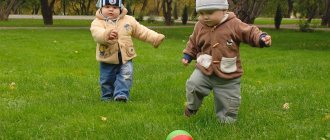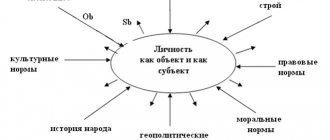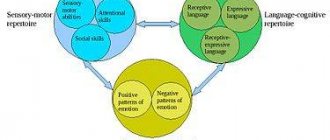In this article:
- The concept of personality in psychology
- Distinctive personality traits
- Theories of personality development in psychology
- 4 factors influencing personality development
- Mechanisms of personality development in psychology
- Concepts of stages of personality development in psychology
- Laws of personality development in psychology
- Self Development Tips
- 7 common mistakes in personality development in psychology
Personality development in psychology is a vast field of knowledge that contains many theories that describe the psychological formation of a person. This process begins from the moment of birth and lasts throughout life, which is why it is so important to monitor what is happening and correct negative manifestations.
A person’s own efforts aimed at self-development are also important. In our article we will tell you how personality develops from a psychological point of view, what rules this process obeys, and what you can do on your own for the benefit of your psychological health.
The concept of personality in psychology
Currently, there is no single and unambiguous definition of personality in psychology; each of the many concepts should be taken into account in order to most fully reflect it.
The most commonly used definition is that a person is a person with a certain set of psychological characteristics that form the basis of his actions that are significant for society; that which internally distinguishes people from each other.
For a more objective understanding, here are a few more definitions:
- A personality is a social subject with a set of roles he plays, both personal and social, as well as his preferences and habits, his accumulated knowledge and experience.
- Personality is a person who independently builds and controls his life and is fully responsible for it.
In addition to the concept of “personality,” the terms “individual” and “individuality” are also used in psychology.
- An individual is a separate person with his own unique innate and acquired characteristics.
- Individuality is a set of unique qualities inherent in a person that distinguishes him from other people; the uniqueness of the human personality and psyche.
We cannot talk about the identity of these concepts, but we also should not completely separate them from each other, since a person is multifaceted and cannot be viewed one-sidedly.
To obtain an objective idea of personality as a psychological phenomenon, you must first understand its structure.
Self-awareness as a separate component and sign of personality development
Self-awareness (the product of which is the self-concept) is actively formed in adolescence, although its emergence begins much earlier. It flows from the consciousness of the individual. This is a system of attitudes, an attitude towards oneself. You can read more about self-awareness in the article “Self-awareness - what is it in psychology. Its structure and functions."
Distinctive personality traits
Personality properties are a set of innate and acquired characteristics of a person that underlie his activities and relationships with people around him and the world. In psychology, the main personality properties on which interaction with society depends are character, temperament, will, abilities, motivation and emotions.
In psychology, character is understood as an acquired way of relating to other people. It includes a certain manner of behavior, as well as a reaction to events happening to a person. Character can be soft and delicate, or rude and unceremonious.
Will means a person’s ability to control his psyche, control his actions, behavior, react in a certain way to what is happening, and bring changes to the world around him. Willpower is usually talked about when it is necessary to make important, conscious decisions, the implementation of which requires the application of certain efforts and overcoming obstacles.
Will is associated with self-restraint, self-control, the need to give up something to achieve a goal, that is, a person must sacrifice something momentary, but attractive to him, in order to get the distant desired.
The main feature of will is that, having achieved a result, a person experiences moral satisfaction.
The main feature of will is that, having achieved a result, a person experiences moral satisfaction. In the process of achieving a goal, emotional joy arises very rarely. The individual directs all his strength to overcome himself, any obstacles and get the desired result. The stronger the will he has, the easier he copes with difficulties and the faster he develops.
In psychology, temperament is understood as the mental qualities of a person that determine his behavior, mood, rate of change, and emotional stability.
Emotions in psychology are the positive and negative individual experiences a person experiences in response to certain situations and stimuli. The following types of emotions are distinguished:
- Mood, which refers to the general mood of a person at different times.
- Simple emotions that are associated with the need to satisfy basic needs.
- Feelings mean a complex of experiences caused by an attitude towards a certain object.
- Affects are bright and acute emotions that arise as a response to a stimulus, characterized by short duration and high intensity.
- Passion is a strong emotion that a person cannot control.
- Stress is a combination of negative emotions and a person’s physical condition that occurs in response to psychological and emotional overload.
The quality of a person's life largely depends on the emotions he experiences. People feel different emotions, the difference lies in the speed with which they react to certain events and stimuli, how long they experience what happened, what emotions they experience more often - positive or negative. Experiences influence the actions a person performs and the decisions he makes.
Motivation in psychology is understood as a set of reasons underlying human behavior.
A motive causes an individual's purposeful behavior. Motivation is influenced by a person’s desires, his need for something. It is thanks to setting goals that he begins to take active actions to achieve them.
Abilities mean innate abilities and skills, without which it is impossible to solve certain problems. They help to acquire knowledge and experience more easily and quickly, which in the future help to better cope with the tasks facing a person.
The role of parenting
Causes of conflicts - the main factors that can influence this
Personality is always formed under the influence of many factors, but education plays the main role among them. It depends on the parents whether the child will be drawn to knowledge, his concentration and desire to explore the world. In early childhood, children begin to learn the rules and norms of behavior in society.
Family reading a book
Education can be spontaneous (chaotic) and purposeful. Spontaneous education is interconnected with everyday life; the child gains knowledge through trial and error. Purposeful education is an orderly process of teaching by parents and teachers with the goal of instilling in a child good manners, rules of behavior and life values.
What influences the success of the educational process in the family:
- Parental awareness is the main criterion for a successful process. Spouses must understand the goals and objectives of raising their child;
- Compliance of family education with the curriculum of kindergarten and school. Often, the desire of parents to instill positive qualities in their child coincides with generally accepted educational systems, but their actions must be parallel. For example, if rules of etiquette are taught at school, they should be practically reinforced at home;
- Family life and equality. Spouses must act together and raise the child according to the same rules. For example, if mom forbids eating sweets, but dad doesn’t, the child will not figure out what the right decision is and who is wrong. Mom will be strict for him, and dad will be kind;
- The ability of parents to combine love, respect and severity in their attitude. Strict upbringing forms complexes in a child, and constant affection and indulgence of all desires make him an egoist;
- The presence of parental authority in the eyes of the child. Children must respect their parents; for this, mom and dad must set a good example. Authority is formed when children see how their parents successfully combine work and social activities. Spouses should be interested in the child’s life; they can point out his mistakes and help correct them;
- Parents' relationships. Children should grow up in a family where spouses respect each other's opinions. Otherwise, the child will show disrespect towards peers and teachers.
Note! If a child has been abused by his father or mother, he may do the same to others in the future and become a criminal.
Theories of personality development in psychology
- Psychodynamic theory.
Classical psychoanalysis, or Freudianism, is the most famous theory of personality development in psychology. Sigmund Freud based his theory on the constant evolving interaction between instincts and drives (on the one hand) and motives, consciousness, and moral and ethical standards (on the other). The reactions and behavior of the individual depend on this interaction, with the unconscious playing a major role.
- Psychoanalytic theory.
Carl Jung initially worked with Sigmund Freud, but later developed his own theory of personality development in psychology - analytical psychology. Jung identified three components of personality: the individual unconscious, the collective unconscious and consciousness.
Jung introduced the concepts of extraversion and introversion into personality psychology, as well as four mental processes: thinking, feeling, intuition, sensation.
- Individual theory.
The theory of individual personality development was first introduced into psychology by an Austrian of Jewish origin, Alfred Adler. His theory is based on the integrity, uniqueness, and uniqueness of the individual. The actions and behavior of an individual depend not on innate instincts, but on unity with others. Personality development according to Adler’s theory occurs due to:
- feelings of inferiority and compensation;
- striving for superiority;
- lifestyle;
- taking into account the creative “I”;
- public interest;
- fictitious finalism.
- Behavioral theory.
The behavioral theory of personality development in psychology includes two main directions: reflexive and social. The founder of the first is the follower of classical behaviorism B. Skinner. Social theory was developed by the Americans A. Bandura and J. Rotter. Both directions are based on the fact that a person develops in accordance with the environment; genetic and mental inheritance do not matter. Personal development depends on the acquired knowledge, skills, and experience. Psychological characteristics consist of generalized behavioral reflexes and social skills.
Transits of Saturn by year
Transits and cycles of planets. About Saturn. Transits of Saturn by year. What is important to do during the Saturn Return
Read >
- Humanistic theory.
The humanistic theory of personality development in psychology consists of two main directions:
- Supporters of the client-centric direction believe that a person develops thanks to an innate desire for self-actualization and control of one’s own development, i.e., by nature, a person is an active, self-realizing subject.
- According to supporters of the motivational direction of personality development, a person is a “desiring creature.” He constantly experiences certain needs that are never fully satisfied: as soon as what he wants is achieved, a new desire arises, which also needs to be satisfied. An individual rarely completely lacks desires and needs; these are isolated, quickly passing cases.
- Cognitive theory.
The founder of the cognitive theory of personality development in psychology, the American George Alexander Kelly, believed that a person develops in accordance with his social environment, his behavior depends on the characteristics of the individual’s cognitive processes (perception, representation, memory, speech, thinking).
Mechanisms of personality development in psychology
- Assignment.
The most common mechanism of personality development in psychology is called “appropriation”. It means that a person’s personality independently forms and develops as he comes into contact with the environment. During personal or social activities, an individual experiences the formation and “appropriation” of personal qualities, which subsequently continue to develop.
- Separation.
Another mechanism of personality development in psychology is “isolation”. The point is that a person is not ready to completely adopt social principles; for him, it is important to stand out among his own kind. The process is also called individualization, which assumes that a person develops individual personal qualities that distinguish him from other people.
This mechanism of personality development in psychology includes two directions:
- internal (psychological), to which experts include such individual psychological properties of a person as the level of development of intelligence, belonging to one or another type of temperament, character traits inherent in the individual, etc.;
- external (material and physical), which includes physical parameters, for example, nationality, gender identity, etc.
- Identification.
Psychology calls “identification” the most complex mechanism of personality development. We are talking about the desire to imitate an object that arouses interest or sympathy in a person. An individual on an emotional level tries to copy another personality. This mechanism can be observed in children who, from an early age, strive to do everything the same way as their parents do.
How a person’s environment is formed
Every person tries to create an environment around himself that would in every possible way contribute to his development and self-improvement. At the same time, he should not feel constrained and restless. After all, everyone understands that it is much easier to develop in an environment where all other people also strive to improve and improve their lives.
According to scientists, the influence of the environment on each individual person is almost invisible, but has a very powerful effect. Therefore, it is necessary to try to create an environment around yourself exclusively of successful and interesting people. To create a successful environment, you must follow the following principles:
- Always look for opportunities to meet and communicate with interesting and successful people. When talking with them, you can always glean some important and necessary information. However, you should remember that you yourself must be somehow interesting to this person.
- Study the works of interesting people. This could be an autobiography, a book, video or audio material. You can learn a lot of useful things from them.
- Develop diversified. This includes various habits and hobbies: morning workouts in the open air, yoga classes, trainings, seminars, etc. At such events, you can often meet like-minded people and form a successful environment.
Creating an environment means continuously working to improve yourself, at every moment and in any area.
To improve yourself, you need to set more complex tasks and goals for yourself each time. Depending on age and social status, they can be completely different, but the main factor must remain unchanged, that any activity must be aimed at improving the individual as a person.
Concepts of stages of personality development in psychology
Psychology calls the main goal of personality development, which is to gain personal freedom. There are several development concepts, which we will discuss below.
- E. Erickson's concept.
Psychoanalyst E. Erikson says that there are eight stages of personality development. In each of them, the individual faces a conflict generated by forces opposite to those that he himself possesses. With a successful resolution of the situation, a person develops new personality traits and moves to the next stage of development. If the situation does not find a solution, then it becomes the cause of neuroses and maladjustment.
Erikson identifies the following contradictions and problems in the process of personality development in psychology:
- the contradiction between trust and distrust in the surrounding reality (typical of children from birth until they reach the age of one);
- the contradiction between independence with shame and doubt (experienced by children from the age of one to three years);
- the contradiction between initiative and guilt (typical for children from four to five years of age);
- the contradiction between hard work and feelings of inferiority (typical of children from six to eleven years of age);
- the contradiction between awareness of identity with a certain gender and a lack of understanding of the behavior characteristic of this gender (experienced by adolescents from the age of twelve until the age of eighteen);
- the contradiction between the desire for intimate relationships and the feeling of isolation from others (typical of early adulthood);
- the contradiction between vital activity and focus on one’s own problems, needs, interests (experienced by people of middle adulthood);
- the contradiction between a feeling of fullness of life and despair (typical of people in late adulthood).
Elements of the zodiac signs: their characteristics and compatibility
The meaning of the elements of the zodiac signs. Element of Earth. Element of Water. Element of Fire. Element of Air. Compatibility of Earth signs. Compatibility of Water signs. Compatibility of Fire signs. Air sign compatibility
Read >
- Concept by V. I. Slobodchikov.
Age-related development of personality in psychology, according to V. I. Slobodchikov, should be considered from the point of view of the development of the individual’s subjectivity in relation to his behavior:
- Revitalization (typical for children under one year old). During this period, the child gets acquainted with his body, begins to understand it, which is manifested in his performance of motor, sensory and sociable actions.
- Animation (typical of children from 11 months to 6.5 years). The child begins to become aware of himself in the world, learns to walk, and interact with the objects around him. Cultural skills are being studied and abilities are being developed. In three-year-old children, one can observe a pronounced position: “I myself,” which is a consequence of the child’s awareness of his desires and capabilities.
- Personalization (typical for children from 5.5 years to 13–18 years). During this period, the child realizes himself as a real or potential creator of his life. He learns to build boundaries and take responsibility for his future. He is helped in developing his personality by senior mentors, as well as peers with whom he interacts during the personalization stage.
- Individualization (occurs from 17–21 years to 31–42 years). During this period, the individual appropriates and individualizes social values, which he then considers from the perspective of his personal worldview. A person’s “self” is built by overcoming the restrictions imposed by society and destroying the assessments of others. This is a period of moving away from stereotypes, other people's opinions and pressure from others. Now the individual is able to independently accept or not accept what he receives from the world.
- Universalization (typical for people aged 39–45 years). At this time, a person expands the scope of individuality and moves to the level of existentiality; he begins to feel like an element of all humanity in the context of past and future world history.
So, personality development in psychology is closely related to age-related changes.
However, certain mental processes can occur over a fairly wide period of time. And this period increases the older the person gets. Based on this, expressions such as “precocious” or “stuck in development” arose. In reality, we are only talking about the fact that physical and personal development are somewhat different from each other.
Personality development in psychology can also be considered from the point of view of changes occurring in the individual psychological space of the individual, consisting of:
- bodies;
- surrounding objects that are significant to the individual;
- habits;
- relationships, connections;
- values.
The accumulation of these elements occurs as the child develops physically. However, they are also characteristic of adults. The favorable development of an individual is possible provided that all of them are inviolable.
- Life path.
Personal development in psychology occurs as a person moves along the path of life, during which goals, motives and values are formed, they also structure this path.
In other words, we are talking about a person’s life scenario. A consensus in psychology on this issue has not yet been formed.
Russian scientists are inclined to believe that the individual himself forms his own life scenario; parents can help him with this, but the person makes the choice himself.
Other psychologists (such as Adler, Berne, Rogers) believe that the leading factor shaping the life scenario is the unconscious, namely: upbringing, personal characteristics of parents, the order of birth of the child, stressful and conflict situations that arise in life, etc.
Social environment
This factor has a strong influence on personality change. Many researchers have attached importance to the environment.
For example, one researcher, in his work, compiled the theories of some scientists - Aristotle, Hippocrates, Confucius, based on which the difference in individual actions lies in climatic, geographical and other natural factors.
People who grew up in different conditions can be very different from each other. Of course, not only geographical or climatic conditions can be attributed to the physical environment. There is a so-called SOCIAL environment, which has no less influence on the development of a person as an individual. From the very first years of life, the social foundation is laid. It is during these years that children absorb all information like a sponge.
See also: Under what conditions is a child’s personal growth possible?
If we divide human socialization into groups, we can distinguish several:
- Childhood period . The development of personality is greatly influenced by nothing other than parental opinion. Those habits that are instilled in a child from childhood will remain with him throughout his life.
- Preschool . In the preschool period, the influence is exerted by the children who are nearby at that moment. Who also study in kindergarten. The child learns to build his relationships with other children and teachers. The child changes by imitating the “popular” children. Habits and even character may change.
- Teenage. During adolescence, children are faced with the problem of sharp differences in the behavior of the social group around them. This often causes a teenage crisis, which is characterized by a spirit of rebellion, the desire to do something individually, not like everyone else, and not as accepted in society.
- Youthful . At adolescence, the active period of merging with society ends. Important changes are now taking place both physically and psychologically. There is a recognition of your “I”, your purpose in life. One can observe a continuous search for moral values related to the meaning of life.
See also: Is it possible to increase immunity through fitness?
Laws of personality development in psychology
Patterns of personality development are studied by the psychology of personal growth. They also form the basis of educational programs for children and adolescents. Thanks to knowledge of patterns, psychoanalysts better understand clients and help them, guiding them on the path of formation and self-development.
The laws of personality development in psychology include:
- psychological changes occurring in the individual;
- the existing relationship between spheres and directions of development;
- specific features of personality development;
- differences in development over time and other criteria (between peers who may develop faster or slower);
- formation of a person’s own views and beliefs;
- manifestation of certain psychological characteristics (sensitivity);
- processing, study/awareness of different areas of life;
- plasticity of an individual’s development (one personal component can be compensated by another);
- contradictions that arise between a person and the surrounding world;
- constantly progressive personal development.
Find out what influences a child's development
Undoubtedly, parents play a leading role in the process of shaping a child’s personality, but outside influence should not be neglected. So this is:
- Biological factor - heredity. A child can inherit the parent's temperament, habits, talents and, unfortunately, illnesses.
- Social. This is the environment in which the child lives. Not only family, school, friends, but also the media. He watches the news on TV and reads newspapers and magazines that he can find at home. At an early age, he is not able to filter information and takes everything on faith. Therefore, it is very difficult to protect your child from negative content; it is better to try to explain that it is bad and is not necessary for him.
- And environmental. Climatic conditions influence both the physiological and personal development of a child.
It is important to be able to recognize developmental disabilities. This, for example, can manifest itself in a child’s anxiety
Excitement and fear should alert parents.
Self Development Tips
Self-development occurs constantly, this process has no end. You can only move forward or backward, going through evolution or degradation. Having embarked on the path of personality development in psychology, it is necessary:
- Find the weak sides of your personality, for example, by interviewing trustworthy friends and writing down those qualities that you don’t like (pessimism, constant complaints, whining, stubbornness, lack of development, laziness, etc.). The more complete and honest the list is, the better.
- Decide on priorities. For some, it is important to increase their level of sociability and make new friends, for others, developing hard work and moving up the career ladder is of great importance, a third strives to travel, and a fourth wants to realize his or her role as a homemaker.
- You must constantly move towards your intended goal, without losing your way, taking small but daily steps. There is no need to implement one idea today and abandon it tomorrow to solve another problem. If your goal is to save a million, then you should calculate how many days it will take, how much you should save daily/weekly/monthly, and then just do these actions every day. You may need to give up some small, unnecessary but regular expenses, like a glass of coffee at a coffee shop every morning.
Color of the day according to the lunar calendar: learn to attract good luck!
Features of the lunar calendar. Life according to the lunar calendar. Planning your day according to the lunar calendar. Color of the day according to the lunar calendar
Read >
- It is very important to constantly develop and learn new things. However, in no case should you limit yourself to theory; it is important to apply the acquired knowledge in practice, otherwise it will remain unclaimed and will not bear any fruit.
- It's also worth reconsidering your surroundings. If someone interferes with personal development, constantly devalues, casts doubt on all undertakings, then you should minimize communication with such people. You may need to seek the help of a psychologist for this.
- Increase usefulness, both for yourself and your loved ones, and for society as a whole. This does not mean that you urgently need to make some discoveries, but it is worth learning to hear other people and help them if necessary.
- Learn to be aware, be in the moment, be here and now.
- Study body language, monitor posture, facial expression, smile, gait, facial expressions, etc. If you are open to the world, radiate positivity, the world will reciprocate.
- Review your style, change it if necessary. Get rid of an overly gloomy wardrobe, choose things in accordance with age, social status, and the right size. It would be better if there were few of them, but they would be of high quality and compatible with each other.
Similar articles
Psychology of a child’s drawing: how a baby speaks to you through scribbles Ekaterina Yurkova
•December 9, 23:40
10 secrets of a woman’s psychology in relationships Ekaterina Yurkova •December 9, 23:40
The psychological picture of the world and its impact on human life Zhanna Vamush •December 9, 23:40
Human life cycles: what the stars are talking about Ekaterina Yurkova •December 9, 23:40
Development of internal energy is possible: 10 effective techniques Ekaterina Yurkova •December 9, 23:40
- Become responsible and independent, accept the fact that no one except the person himself is responsible for how he lives. The individual finds himself in the role of a victim because he himself took the steps that led him to this point. The good news is that the individual himself can change the situation the way he needs, the main thing is to want and start acting.
Afterword
Personal development is a difficult and contradictory process that continues throughout life. A stop in development is fraught with degradation and disintegration of personality.
Personality formation is a purposeful and organized process. At first it is organized by the parents and the child’s environment, and later by the person himself and the environment.
Thus, the formation and development of personality occurs in the process of human interaction with the outside world and people. However, in order to become a person, you need to learn to set boundaries between the understanding of “yourself” and “not yourself.” What does it mean:
- participation in the life of society, but not total dissolution in it;
- the ability to resist and maintain individuality.
Recently, it has been important to talk not only about the creative element of personality, but also about the creative principle, which means “being the creator of life.”
The question of the boundaries of the influence of the biological and social in a person during the development of personality has not yet been settled. Gene research continues. Scientists do not rule out that in the future some phenomena recognized as acquired will actually be transferred to the category of hereditary ones.









